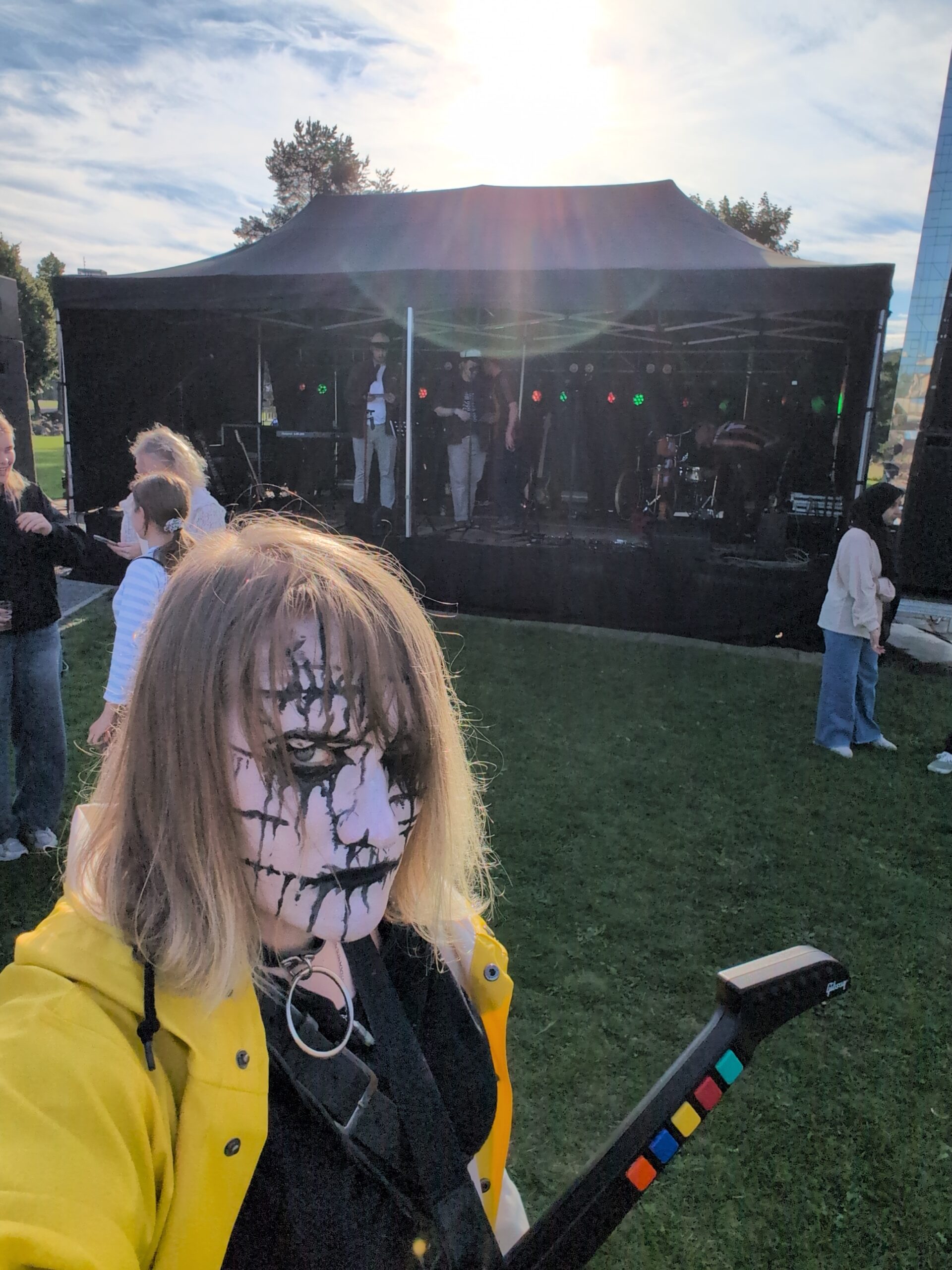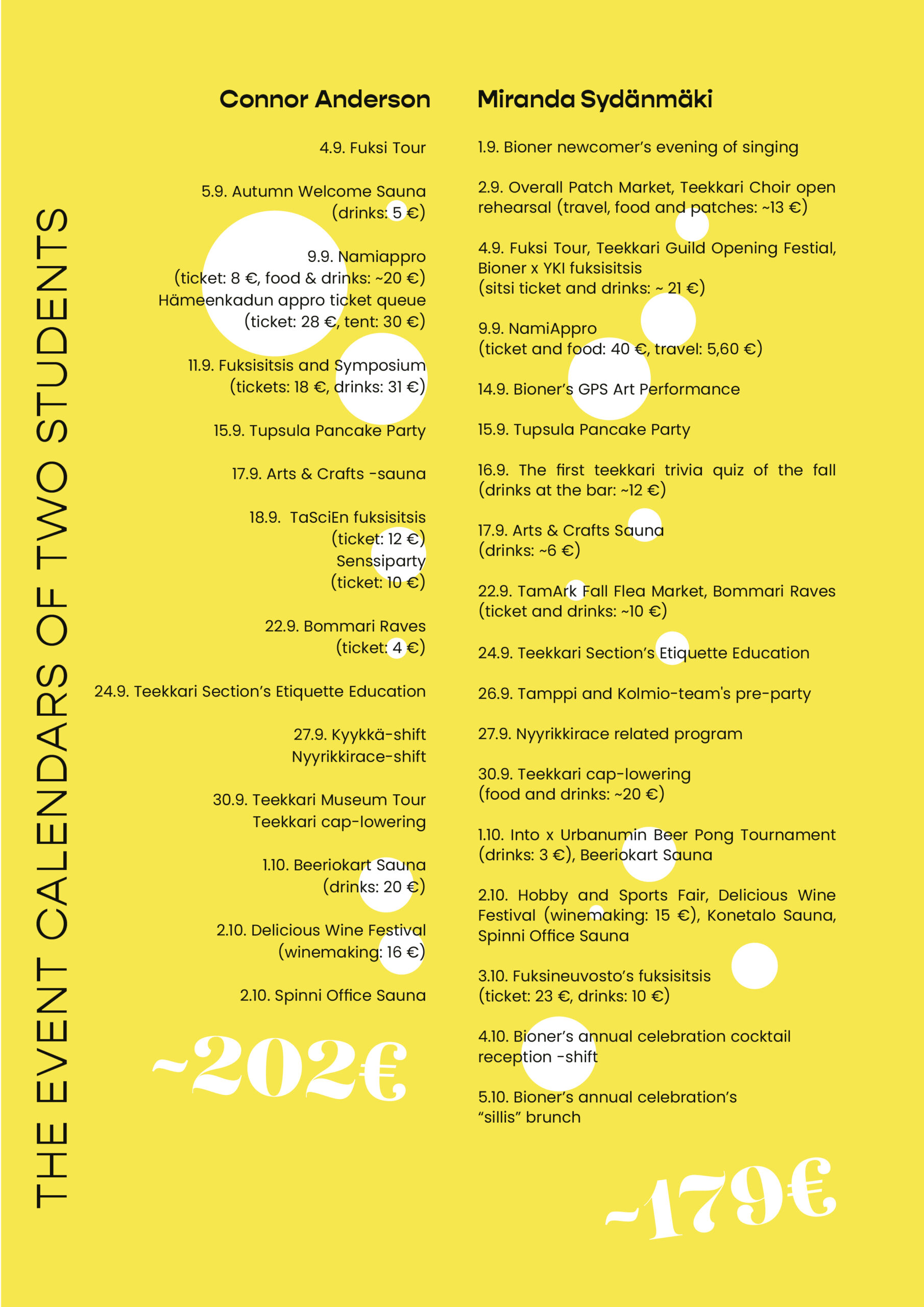Party budget: How much will the fall semester wreck your wallet?
In the fall, it feels like there's a student event almost every day. Can students afford to take part in all the festivities?
Original text and pictures: Venni Uotila
Translation: Venni Uotila
Voit lukea jutun myös suomeksi.
Fall can be an expensive time for a student. Calendars are booked with events ranging from sitsis to sauna nights. In addition to various general and interdisciplinary events, different departmental clubs organize festivities primarily aimed at their own students. Many of these are paid events.
A quick overview shows that student pricing is typically taken into account when setting the prices for these events – for many of them, you can get a ticket for under ten euros. However, for a socially active student, these costs can add up and become a significant expense.
Trey’s Executive Board member and event coordinator, Ina Lehtola, has noticed that the pricing of student events has recently become a topic of discussion among students.
“There’s been general talk that if event prices rise significantly, it could very well affect attendance,” Lehtola says.
According to Lehtola, Trey hasn’t had to significantly raise the prices of its own events. However, she notes that the cost structures of events have changed, and finding collaborators has become more difficult.
In addition to Trey, many other parties organize events, such as departmental clubs. For example, the business students’ club Boomi ry organizes the biggest annual student event, Hämeenkadun Appro, where the ticket cost 16 euros in 2018, whereas this year it cost 28 euros.
We asked two students from Tampere University to track the events they attended and how much they spent on them during September and October.
Budgeting helps

Connor Anderson, an exchange student and newcomer to the master’s program in architecture, thinks the tickets are quite cheap. He’s glad that there are also many events students can attend for free.
“This week alone, I have like seven or eight events I’m going to, and apart from one, I don’t have to pay for any of them,” Anderson says.
Miranda Sydänmäki, a first-year student of biotechnology and biomedical engineering, also considers student events to be reasonably priced. Before her current studies, Sydänmäki studied in another field, so she has been a student at Tampere University since 2017.

“In my experience, the prices of, for example, sitsit have increased since I first started my studies,” Sydänmäki says.
Sydänmäki hasn’t felt that she has had to give up anything in order to attend events. She believes that entering adulthood has taught her some general budgeting skills.
Before coming to Finland, Anderson had budgeted a lot of money for events and socializing with friends. He continues to track his expenses to ensure he has some extra money left after finishing his studies—just in case.
“You definitely have to take into consideration all the event prices,” Anderson says.
Alcohol is a major expense
Connor Anderson has noticed that alcohol is the biggest expense when attending events, since alcohol is so expensive.
”The problem is, if you have one or two drinks, you’re more likely to buy more and end up spending more than you wanted,” Anderson says.
“I just bought a ticket for a bar crawl for 25 euros, and I know I’ll spend much more on alcohol alone than on the ticket.”
Sometimes, if Anderson is going to an event at a bar, he chooses to drink less or pregame, so he doesn’t have to spend so much on expensive drinks.
Miranda Sydänmäki quit drinking alcohol a year ago, and she has noticed a significant decrease in her event-related expenses.
“Nowadays, I might buy more sweets or baked goods, which maybe balances things out a little. But even then, I can’t reach the amount I remember spending on alcohol during my earlier student years,” Sydänmäki reflects.
FOMO isn’t an issue
We asked the two students whether they or their friends feel pressure to attend events out of fear of missing out. FOMO – the fear of missing out – is the feeling of being excluded from something enjoyable that others are experiencing. It can cause anxiety and lead to trying to take part in everything.
Connor Anderson hasn’t experienced FOMO yet—probably because he goes to more events than any of his friends. He’s aiming for the superfuksi title, which means he is trying to collect as many points as possible by attending events.
“Unless it’s a unique point event, if I don’t feel like going, it’s fine,” Anderson says.
For Sydänmäki, the biggest motivation to attend events also comes from her aspiration to be a superfuksi. She is most interested in events she hadn’t experienced before becoming a newcomer tech student, but she hasn’t really experienced FOMO.
“I’ve attended a lot of student events and lived a somewhat hardcore student life even before this attempt at the superfuksi title, or even before starting my new studies,” Sydänmäki explains.
Being left out doesn’t worry the superfuksi candidates, but other things do.
“I’m more stressed about whether I can make it to unique events, if there will be enough tickets, whether my registration will be successful, that hopefully I don’t get sick, if I’ll have enough energy in the first place, whether my studies will go to shit because I go to events, etc.,” Sydänmäki lists.


Increased costs
Connor Anderson and Miranda Sydänmäki both think that student event tickets are great value for money, often including good food and drinks.
Trey hasn’t received any feedback from students regarding event prices either. Ina Lehtola says that they have always aimed to keep events as accessible to students as possible through their pricing. Trey does not make a profit from its events; instead, it spends money on organizing them.
“In principle, they are unprofitable,” Lehtola explains.
She believes that participants don’t necessarily understand what goes into the price. For example, increased costs for event organizers have affected both event and ticket prices.
